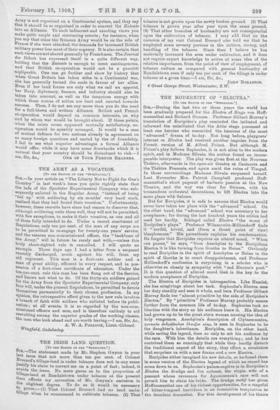THE ARMY AS A VOCATION.
[To TIM nerroa Or WIN .SPICCTATOIL."] Sia,—In your article on " The Liberty Not to Fight for One's Country" in last week's issue you quite rightly state that the lads of the Spectator Experimental Company who sub• aequently enlisted in the Regular Army, "instead of being 'fed up' with soldiering by six months' very bard work, realised that they had found their vocation." Unfortunately, however, these recruits have since had reason to discover that, although soldiering suits them well, they will not be permitted, with few exceptions, to make it their vocation, as one and all of them fully intended to do. Under a recent enactment of
Regulations, only ten per cent. of the men of any corps are to be permitted to re-engage for twenty-one years' service, and the veteran non-commissioned officer, the "backbone of the Army," will in future be rarely met with,—unless this truly short-sighted rule is cancelled. I will quote an example. Three days ago I bad a letter from a sergeant recently discharged, much against his will, from my old regiment. This man is a first-rate soldier and a an of great ability, efficient in every respect, and in pos-
session of a first-class certificate of education. tinder the ton-per-cent. rule this man has been flung out of the Service, and knows not what to do. Of the thirty-six soldiers gained for the Army from the Spectator Experimental Company, only four will, under the present Regulations, be permitted to devote themselves permanently to their chosen profession. In my opinion, the retrospective effect given to the new rule involves a breach of faith with soldiers who enlisted before its publi- cation; at all events, it is so regarded by the non-com- missioned officers and men, and is therefore unlikely to aid recruiting among the superior grades of the working classes, the men who look ahead and are worth having.—I am, Sir, &c.,
A. W. A. POLLOCE, Lieut.-Colonel. Wingfield, Godalming.









































 Previous page
Previous page